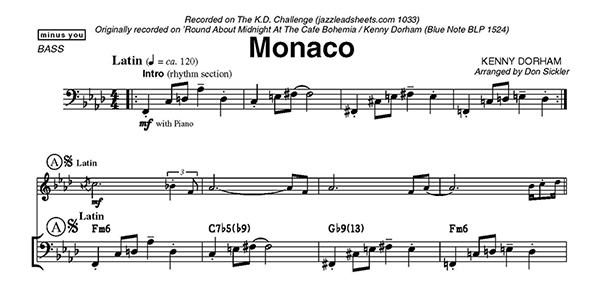About The K.D. Challenge recordings
Our album title, "The K.D. Challenge," is our hint that these Kenny Dorham compositions are not only challenging, they are intriguing, great to play and well worth mastering.
note from Don Sickler:
The Dorham compositions we list under "The K.D. Challenge" album are some of the most unique and important small group compositions in jazz. You won't find these compositions called at typical jam sessions; the parts are individual to each instrument and need preparation by every member of the group. Although most were originally created in a quintet format, they also are great in a quartet or trio format, as you will see. Our Minus You editions and audio tracks are a perfect way to introduce you to these magical compositions. Once you learn them, you'll want to play them again and again.
One of the things that sets Kenny Dorham apart from other composers is his emphasis on the specific roles of the individual rhythm section players. The often distinctive role of each rhythm section player is compositional; part of the composition, not just part of an arrangement of the composition. The independent instrumental parts combine in a delicate interplay that enhances the composition, but it can create confusion for the individual players, if they don't see how their part fits into the whole. Therefore, we've made each rhythm section part double-staved, showing a smaller staff with the melody above each part. You'll find it's very helpful to have the melody staff above your own part. Often we'll also indicate other rhythm section cues so you can see how everything fits together.

Our melody "instrument" parts (for a quartet performance) are also the first parts if it was originally a quintet recording, and we make various second parts available as well, so you can either play the arrangement as it was originally recorded, or with whatever instrumentation you have.
Try our Minus You audio tracks: each rhythm section player gets his or her own track, minus their instrument, to practice with. You can master your interplay role while also accompanying recorded soloists. Melody players will have a great rhythm section behind them.
